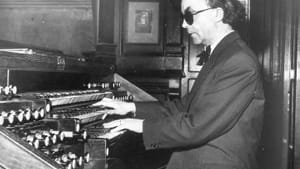Stay in the Loop
BSR publishes on a weekly schedule, with an email newsletter every Wednesday and Thursday morning. There’s no paywall, and subscribing is always free.
Jean Langlais: An appreciation

From early childhood, Jean Langlais, like his eventual organ teacher André Marchal, was blind. Without this condition, he says, he would have been a stonecutter like his father. Instead, he became one of the more uniquely creative organist-composers of the 20th century. A virtuoso improviser, he could write prolifically, unencumbered by technical concerns. His sometimes uneven output thus includes many works that are more trouble than they're worth. However, the gems he left behind, imbued with a distinctive harmonic language, should not be forgotten.
While his classmate Olivier Messiaen seemed to possess a better feel for the rhythmic impulses of Gregorian chant while composing mostly on original melodies, Langlais more often quoted chant tunes and built new musical structures — one might even say metamorphoses — around them, creating a distorted impression. If music were represented in pictures, many of Langlais’s works would be portraits of chant hanging crooked.
The Offertoire on Lucis Creator in Hommage a Frescobaldi is possibly one of Langlais’s saucier chant pieces. A thick registration in the manuals gives the piece a dark hue, while the cantus firmus sings from the pedal, mostly in 3/4 time, making for a danse macabre atmosphere.
More famous is his Te Deum, which has all the rambunctiousness one would expect from a Parisian organist. Like the Fauré Requiem, it is deceiving in its tonal resources, more adventurous than it would seem on first hearing. Without ever losing the chant melody, Langlais flirts with emancipated dissonance, yet doesn’t tax the ear.
But he was not all seriousness. The piece for flutes in the Organ Book intimates a perverse sense of humor. Close harmonies, shifting meters, and an occasional unexpected dotted note give this piece levity, for which organists are not always known.
The times they are a-changing
The tug-of-war between musicians and clergy is an old tale, and for Langlais, organist at Sainte-Clotilde, there was no exception. The waves of change after Vatican II — which arguably went beyond the mandate of the council — hit him particularly hard. Music, being tied to liturgical action, suffered significantly in those days of uncertainty. Decades later, it doesn’t take an ideologue to see that the initial results were less than inspiring, but Langlais had to live through the upheaval, and it took a toll on him.
“I am tired. I want to die,” he said as he faced old age. To an extent, his life was far from glamorous, and even difficult. He was not a perfect man, but musicians looking for consolation in the midst of an indifferent world would do well to hang Langlais’s portrait in their pantheons.
Sign up for our newsletter
All of the week's new articles, all in one place. Sign up for the free weekly BSR newsletters, and don't miss a conversation.